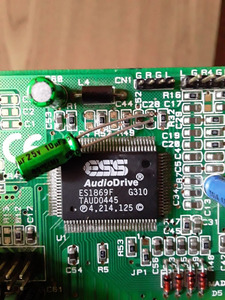Well, regarding popping sounds - they are also present in DosBox, so I'm pretty confident now this is a "junk" DMA transfer issue on startup. It's not ES186x fault by any means.
P.S
And I'm also feeling incredibly stupid now. Having ordered some good caps to replace the old ones only to realize that all of them are bypassed on pcb when external amplifier is disabled.
And also all of the old "TBOR" brand caps are still in-spec regarding their capacitance and ESR, which is something worth praising, considering they are almost 25 years old.
UPD:
I've discovered one thing, which make huge difference in sound between ES1868 and ES1869: coupling caps on AOUT_L and AOUT_R pins of the chip.
All of my ES1868 cards use electrolytic ones, while ES1869 use ceramic.
I've removed right channel ceramic cap and replaced it with bipolar electrolytic one, then recorded split stereo track to test.
The difference is drastic. Ceramic one sounds high pitched and "flat".
Then I tried 3.3uF film cap (yep, it's huge). It performed almost the same as 10uF electrolytic.
After soldering 100nF film, performance was just a little bit better than 100nF factory ceramic.
I believe 100nF value of the default coupling ceramic cap is just too small for the impedance of line-in recording\headphones.
Also, bigger value cap suppresses popping sound volume a bit.
UPD2:
Replaced both 100nF ceramic caps with 10uF X5R ceramic ones (both are 0805 smd). I can confirm, that it is indeed a cap value that matters most.
When using line-out jumpers (disabling external amp), these coupling caps and the speakers\line-in impedance form a high-pass filter.

